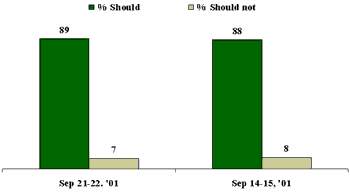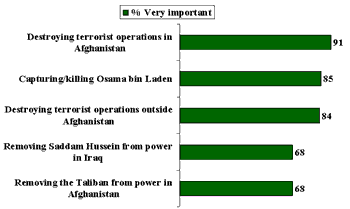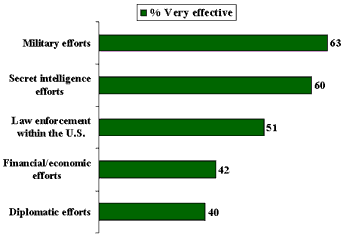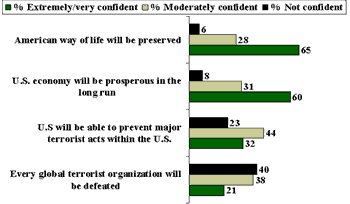GALLUP NEWS SERVICE
PRINCETON, NJ – The world is focused on the pending military action that the United States has promised to take against those responsible for the terrorist attacks of Sep. 11.
The following sections present answers to key questions about the American public's attitudes toward military action and retaliation -- based on Gallup and other polls conducted during the past two weeks since the terrorist attacks.
Do Most Americans Favor the Concept of the United States and its Allies Taking Military Action in Retaliation for the Attacks?
Yes. This is one of the most consistent findings across all of the polling conducted in the aftermath of the Sep. 11 terrorist attacks. Here is the response to a basic question about retaliatory military action asked twice since Sep. 11:
| Do you think the United States should – or should not – take military action in retaliation for Tuesday's attacks on the World Trade Center and the Pentagon? |
 |
In addition, a New York Times/CBS poll conducted over the weekend found that 92% of Americans favored the United States taking military action against "whoever is responsible for the attacks." The latest Fox/Opinion Dynamics survey also found an almost identical 89% in favor of military action in response to a similar question.
It Has Been More Than Two Weeks Since the Attacks, and No Military Action Has Yet Been Taken -- As Far As We Know. Is There a Sense That Americans Are in Any Way Impatient for a Quick Military Response in Retaliation for the Devastation Caused by Terrorists on Sep. 11?
Polling results so far suggest that the American public is willing to wait for the appropriate time for a military response, rather than rushing into battle immediately.
Americans' responses to questions asking about the time frame for military response:
|
2001 Sep 14-15 |
|
|
% |
|
|
Should take immediate action against known terrorist organizations |
23 |
|
Should take action against responsible terrorists once they are identified, even if that takes months |
62 |
|
Should take immediate action, unspecified |
1 |
|
Should not take military action |
10 |
|
No opinion |
4 |
Here we see that about six out of 10 Americans express a willingness to wait -- even if that is a period of months -- until the responsible terrorists are identified. A similar question asked in a Newsweek poll conducted Sep. 20-21 gave respondents a list of alternatives relating to a timetable for war, and found that about six out of 10 said the United States should take as long as it is necessary to plan something that will work in terms of military action. About 15% said military action "should start within the next few weeks." Seventeen percent said military action should have already been started.
The 17% of respondents in the Newsweek poll representing those who think that military action should already have begun is consistent with the findings of a recent CNN/USA Today/Gallup Poll, which asked Americans about their attitudes toward President George W. Bush's approach to military action. Nineteen percent felt that the president had not moved quickly enough in terms of military action:
Do you think that President Bush has -- [ROTATED: gone too far in terms of a military response to the terrorist attacks, done about right, or not gone far enough in terms of a military response to the terrorist attacks]?
BASED ON -- 519 -- NATIONAL ADULTS IN FORM A; ±5 PCT. PTS.
|
|
Done |
Not gone far enough |
No |
|
|
2001 Sep 21-22 |
4% |
75 |
19 |
2 |
Do you think that President Bush has -- [ROTATED: gone too far in terms of an economic and diplomatic response to the terrorist attacks, done about right, or not gone far enough in terms of an economic and diplomatic response to the terrorist attacks]?
BASED ON -- 486 -- NATIONAL ADULTS IN FORM B; ±5 PCT. PTS.
|
|
Done |
Not gone far enough |
No |
|
|
2001 Sep 21-22 |
4% |
79 |
14 |
3 |
As can be seen, a slightly smaller percentage say the Bush administration has not moved fast enough in terms of a diplomatic and economic response to the attacks.
In general then, the data suggest that the American public -- so far -- is willing to wait for military action to be taken at the appropriate time, with a small percentage of Americans, somewhere less than 20%, who appear to feel that such action should already have begun.
Do Americans Have Strong Views About the Objectives for Any Pending Military Action?
Although the ultimate strategic objectives of any military action undertaken by the United States and its allies will be determined by the administration and the military, polling has given us a good feel for what the average American thinks should be done.
Here are the results from the Sep. 21-22 Gallup poll that listed five possible objectives and asked respondents to rate the perceived importance of each:
| If the United States takes military action, how important a goal should each of following be -- should it be a very important goal, somewhat important, not too important, or not important at all? How about -- [RANDOM ORDER]? |
 |
| Sep. 21-22, ‘01 |
There has been a very strong media focus on the country of Afghanistan and the radical Islamic leader Osama bin Laden in the days since the terrorist attacks (bin Laden is on the cover of the current issues of both Time and Newsweek, for example), so it is certainly not surprising that Americans would give the highest levels of importance to destroying terrorist groups in Afghanistan and to either capturing or killing Osama bin Laden himself. At the same time, perhaps reacting to President Bush's call for an effort to destroy terrorism worldwide, there is a strong sentiment in favor of that objective as well.
Americans ascribe somewhat lower levels of importance to removing the Taliban from power in Afghanistan, and also -- in response to a question reminiscent of the Persian Gulf War -- removing Saddam Hussein from power.
Another question included in the most recent Gallup poll asked if Americans thought that "direct military action should be taken in Afghanistan": 89% said yes. Seventy-three percent of the American public said yes to the idea of direct military action against Iraq.
Do Americans Think That the U.S. Military Efforts Will Ultimately Be Successful?
Certainly, indications are that Americans think that U.S. military efforts have a higher chance of being successful than other approaches to combating terrorism, although only 63% of Americans say that the military actions will be "very effective" in the U.S. campaign against terrorism.
| How effective do you think each of the following will be in the U.S. campaign against terrorism -- very effective, somewhat effective, not too effective, or not at all effective? How about -- [RANDOM ORDER]? |
 |
| Sep. 21-22, ‘01 |
About 21% of Americans are either extremely or very confident that the goal of defeating every global terrorist organization will be achieved.
| How confident are you that each of the following will happen -- extremely confident, very confident, moderately confident, not very confident, or not confident at all? How about -- [RANDOM ORDER]? |
 |
| Sep. 21-22, ‘01 |
What About the Issue of Attacking Countries That Harbor Terrorists?
A number of polls have found support for the concept of taking military action against the countries harboring terrorists as well as the terrorists themselves. As noted above, nine out of 10 Americans favor taking direct military action against Afghanistan, even though the question does not specify against whom within the country such action would be taken. Eighty-three percent of those polled in a recent CBS/New York Times poll said they favored going to war "with a nation that is harboring those responsible for the attacks."
Secretary of Defense Donald Rumsfeld Says This Will Not Be an "Antiseptic" War. Are Americans Ready to Put Up With the Consequences of a Protracted, Large-Scale Military Effort?
Yes. One of the most persistent findings in polling conducted since Sep. 11 has been the extent to which Americans support military action against those responsible for the terrorism even when it is made clear that there could be significant consequences of such action.
In the Sep. 14-15 CNN/USA Today/Gallup poll, 86% supported military action if it lasted a period of several months, and a still-high 66% said they would support the United States taking military action even if it would continue for a period of several years.
The recent New York Times/CBS poll found that 72% supported going to war even it might mean a military engagement that could last for many years. An ABC News/Washington Post poll found that 69% of Americans support going to war even if it means "getting into a long war with large numbers of U.S. troops killed or injured." An NBC News/Wall Street Journal poll found 83% support "even if it means risking further retaliation and the threat of war." In fact, the same NBC/WSJ poll showed that more Americans were worried about the United States under-reacting and not doing enough in response to the attacks than were worried about the United States overreacting and doing too much.
The Sep. 21-22 Gallup poll introduced the idea of a war that might cost the lives of 5,000 U.S. troops and 5,000 U.S. civilians. In each instance, about eight out of 10 respondents continued to say they would support the U.S. campaign against terrorism even with these consequences. The New York Times/CBS poll got at this issue in slightly different ways, but found that about seven out of 10 supported military action even if it meant that "many thousands of innocent civilians would be killed," and if "thousands of American military personnel would be killed."
A Newsweek poll found that seven out of 10 Americans supported U.S. military action even if it meant that there is a "high likelihood of civilian casualties."
What About the Possible Continuing Disruptions Within America That Could Be the Result of an Extended Military Campaign Against Terrorism?
As is the case in terms of possible ancillary deaths and injuries that could result from military action, a Gallup poll conducted in the initial aftermath of the attacks also showed that the public supported military action even in the face of significant further disruptions on the home front.
SUMMARY TABLE OF SUPPORT
|
2001 Sep 14-15 |
|
|
|
% |
% |
|
|
Taxes would be increased |
84 |
15 |
|
Shortages of oil and gas would occur |
79 |
18 |
|
Less money to spend on programs such as education and Social Security |
78 |
18 |
|
A prolonged economic recession would occur |
78 |
18 |
|
Further terrorist attacks would occur in the United States |
78 |
19 |
Historically, Men Have Been More Willing to Sanction War and Military Action Than Have Women. Is That True in This Situation?
In Gallup polls conducted in and around the Vietnam War, men were significantly more likely to favor continuing the war there than were women. In the lead up to the Gulf War in 1990, men were also more likely than women to favor going to war against Iraq. In the current situation, however, there are only minor differences between men and women in terms of support for military action against the terrorists responsible for the Sep. 11 attacks.
|
Vietnam |
|||
|
June 4-9, 1965 |
Overall |
Men |
Women |
|
Should the United States. continue its present efforts or should we pull our forces out of Vietnam? |
% |
% |
% |
|
Continue |
66 |
73 |
59 |
|
Pull Out |
20 |
17 |
23 |
|
No Opinion |
14 |
10 |
18 |
|
Persian Gulf |
|||
|
November 29-December 2, 1990 |
|||
|
If the current situation in the Middle East involving Iraq and Kuwait does not change by January (1991), would you favor or oppose the United States going to war with Iraq in order to drive the Iraqis out of Kuwait? |
|||
|
Favor |
52 |
60 |
45 |
|
Oppose |
41 |
36 |
44 |
|
No Opinion |
7 |
4 |
11 |
|
Terrorist Attacks |
|||
|
September 21-22, 2001 |
|||
|
Do you think the United States should -- or should not -- take military action in retaliation for last week's attacks on the World Trade Center and the Pentagon? |
|||
|
Should |
89 |
90 |
88 |
|
Should not |
7 |
7 |
7 |
|
No Opinion |
4 |
3 |
5 |
What About Age? Are Younger People More or Less Willing to Go to War Than Older Americans?
There is also very little difference in support for going to war by age. Younger Americans are no more or less likely to support the concept of military action than are older Americans. One of the biggest differences is in terms of ideology – liberals are less likely to favor military action than are conservatives, but more than eight out of 10 liberals still support military action.
Survey Methods
These results are based on a variety of surveys of adults within the United States since the terrorist attacks on Sep. 11. The latest Gallup survey referenced included telephone interviews with a randomly selected national sample of 1,005 adults, 18 years and older, conducted Sep. 21-22, 2001. For results based on this sample, one can say with 95 percent confidence that the maximum error attributable to sampling and other random effects is plus or minus 3 percentage points. In addition to sampling error, question wording and practical difficulties in conducting surveys can introduce error or bias into the findings of public opinion polls.
